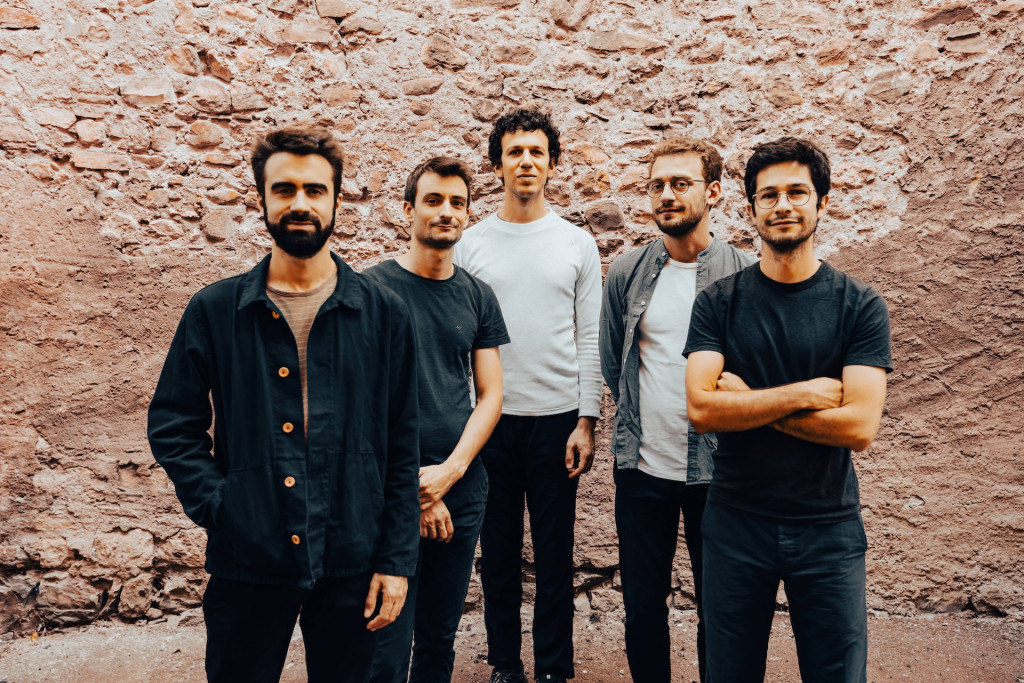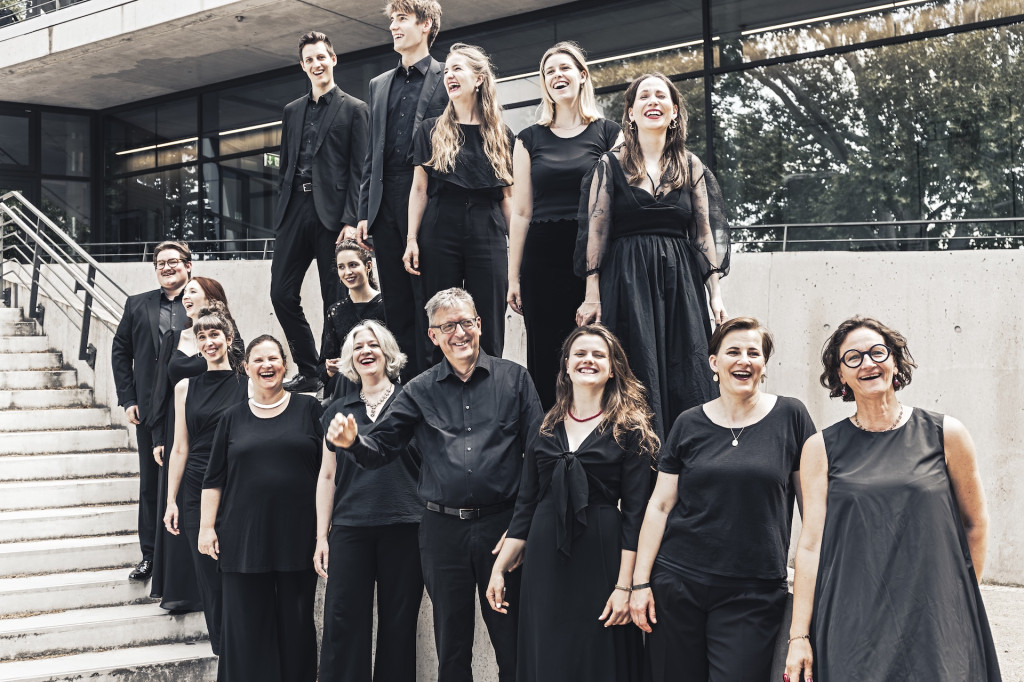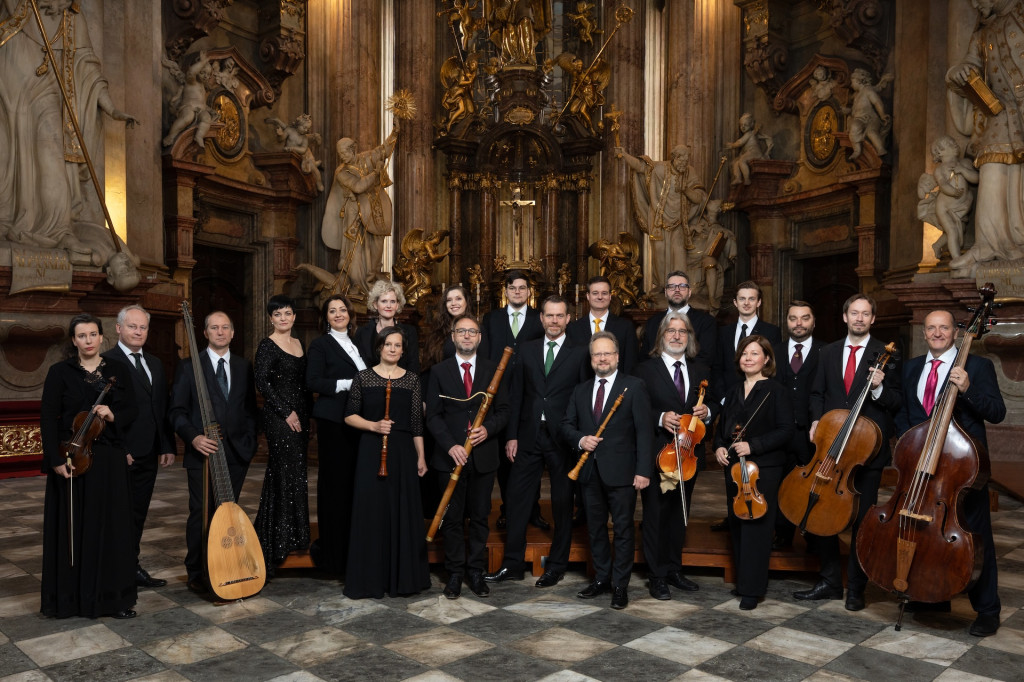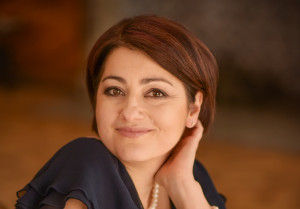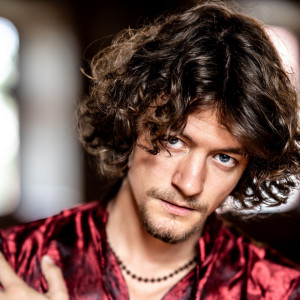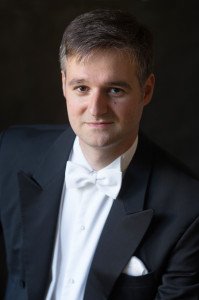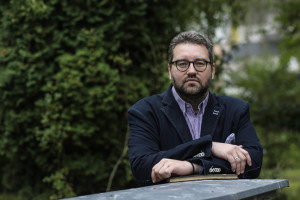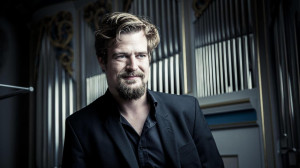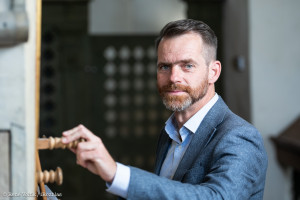Sarbacanes /FR/
Sarbacanes is an ensemble dedicated to 18th- and 19th-century music, with a special focus on wind instruments. Founded in 2016 with two oboes, a bassoon, and a harpsichord, the group has since expanded to include various formations, allowing it to explore a wide range of repertoire—from baroque trio sonatas to large-scale serenades of the classical and romantic eras. The ensemble’s debut recording (released in 2019 on the INITIALE label) features Telemann’s „Ouvertures“ for winds. Its second album (released in 2024 on Oktav Records) showcases the virtuosity of the oboe and bassoon in 18th-century Germany, with works by Vivaldi, Handel, and Zelenka. This recording was awarded a Diapason d’Or. A third CD will be released in autumn 2025, featuring works by Schubert and Mozart in a wind octet formation, once again with Oktav Records. Sarbacanes has performed at the MA Festival in Bruges, the Royaumont Festival, La Folle Journée in Nantes, the Aix-en-Provence Easter Festival, the Cologne Philharmonie, the Flâneries de Reims, the Saint-Céré Festival, the Musicales de Normandie, the Collegio Ghislieri in Pavia, the European Young Talents Festival, the Guildhall in Riga, and more.
Sarbacanes is currently in residence at the Fondation Singer-Polignac.
___________
Dresdner Kammerchor /DE/
The Dresdner Kammerchor is one of the leading choirs in Germany. Since its foundation in 1985 by Hans-Christoph Rademann, it has become firmly established on the German and European musical scenes. With initiatives such as the first complete recording of Heinrich Schütz and a continuing interest in researching and promoting the musical legacy of central Germany, the choir helps shape the cultural identity of this region, working internationally as an ambassador for Dresden and Saxony. In collaboration with the Dresdner Barockorchester and other musical partners, numerous works by Heinrich Schütz, Johann Adolf Hasse, Johann David Heinichen and Jan Dismas Zelenka have been rediscovered. The choir has been honoured with numerous prizes including the German Record Critics’ Award.
Alongside the oratories and sacred works of Baroque masters such as Bach, Telemann and Händel, the choral-symphonic repertoire of the Classical and Romantic periods from Mozart via Mendelssohn to Brahms forms another main focus of the choir’s work. The Dresdner Kammerchor is also renowned for the performance of challenging a cappella literature from the 19th and 20th centuries by composers such as Max Reger, Alfred Schnittke, Ernst Krenek, Olivier Messiaen and Herman Berlinski.
The choir specializes in modern and contemporary music. This is reflected in numerous premieres, first performances, and new works commissioned by the choir. In 2009 Hans-Christoph Rademann and the Dresdner Kammerchor initiated the Dresden Chorwerkstatt fur Neue Musik. The choir was awarded the Ernst von Siemens Music Prize for its services to contemporary music.
The Dresdner Kammerchor has received broad acclaim on its numerous concert trips in and outside Europe, i.e. USA, South Africa, India and China. The choir also receives regular invitations to international music festivals of great reputation like the Rheingau Musik Festival, Oude-Muziek-Festival Utrecht, Festivales Musicales Buenos Aires, Bachwoche Ansbach and Händelfestspiele Halle and Göttingen.
Frequent co-operations with renowned orchestras and conductors from Germany and abroad underscore the reputation of the choir. Among the most famous are the conductors René Jacobs, Sir Roger Norrington, Ádám Fischer, Riccardo Chailly, Herbert Blomstedt and the ensembles Sächsische Staatskapelle Dresden, Gewandhausorchester Leipzig, The Orchestra of the Age of Enlightenment, Concerto Köln and Akademie für Alte Musik Berlin.
___________
Ensemble Inégal /CZ/
Ensemble Inégal and its conductor Adam Viktora earned international acclaim thanks to its highly praised concerts and awarded CD-recordings, thus becoming synonymous with the rediscovery of the legacy of the ingenious Czech baroque composer Jan Dismas Zelenka.
The interpretative range of the highly versatile Ensemble Inégal spans from renaissance to contemporary music. In addition to early music, the ensemble has on its account innovatory performances and recordings of romantic (Dvořák, Rossini) and contemporary music (Britten, Pärt, Schnittke, Glass). Ensemble Inégal has performed at prestigious European festivals such as the Prague Spring Festival, Musica Antiqua Brugge, Oude Muziek Utrecht, Lufthansa Festival London, De Bijloke Gent, Stockholm Early Music Festival, Bachfest Leipzig, and many others. Ensemble Inégal has recorded 20 successful CDs earning a range of prestigious international awards (Diapason d’Or, IRR Outstanding, Goldberg 5 stars, a.o.). The ensemble is regularly featured in broadcasts of television and radio stations (BBC, EBU, Czech Television, Czech Radio, Deutschlandradio Kultur a.o.).
___________
Gabriela Eibenová /CZ/
Soprano Gabriela Eibenová is regarded as a renowned singer in the field of early music interpretation on the Czech music scene. She graduated from the Prague Conservatory, theory and performance practice of early music at Masaryk University and historical performance at JAMU. Together with organist and conductor Adam Viktora, she founded the vocal-instrumental group Ensemble Inégal, which focuses primarily on promoting the work of the Czech Baroque composer Jan Dismas Zelenka. She performs extensively with this ensemble at major international music festivals (Prague Spring, Oude Muziek Utrecht, Tage Alter Musik Regensburg, Musica Antiqua Brugge, Bach Festival Riga, International Music Festival Santander, Lufthansa Music Festival London, Stockholm Early Music Festival, and others). She has sung almost all over Europe, in Israel, Lebanon and Japan. She has recorded more than 40 CDs. She is a vocal teacher at master classes specialising in early music performance. In 2020 she established the Rosa Bohemica music festival, which uses music to enliven and resonate spaces with a strong genius loci.
___________
Jaro Kirchgessner /DE/
The countertenor Jaro Kirchgessner, born in 1997 in Neustadt an der Aisch in Middle Franconia, received his fundamental musical training with the Windsbach Boys Choir. During his time there, he performed in over 600 concerts and frequently sang as a soloist. He then spent a year at the Vocational School for Music in Dinkelsbühl under Birgit Ströbel-König. After completing his bachelor’s degree with top marks under Prof. Hartmut Zabel in Dresden, he is currently pursuing his master’s degree with Prof. Martin Wölfel at the Folkwang University of the Arts in Essen.
At a young age, he has already performed as a soloist at the Würzburger Bachtage, sung in the Kulturpalast Dresden, at the Quedlinburger Musiksommer, and recently at the Thüringer Bachwochen. Additionally, he regularly performs in Dresden, Leipzig, and Weimar.
Jaro Kirchgessner has gained operatic experience through several university projects, such as the chamber opera „Leonce and Lena“ by Kurt Schwaen, the role of Ruggiero in Handel’s „Alcina,“ as Oberon in Britten’s „A Midsummer Night’s Dream,“ and as the „Refugee“ in Dove’s „Flight.“
___________
Tobias Hunger /DE/
The tenor Tobias Hunger began his musical training with the Dresden Choir of the Holy Cross and studied with Hermann Christian Polster at the University of Music Felix Mendelssohn Bartholdy in Leipzig. As an internationally renowned concert and oratorio singer he pays special attention to the music of the 17th and 18th century. He has sung repeatedly with famous ensembles, orchestras and under conductors such as Philippe Herreweghe, Georg Christoph Biller, Václav Luks, Hans-Christoph Rademann, Ludger Rémy, Wolfgang Katschner and Ludwig Güttler. In addition to the entire vocal works of Johann Sebastian Bach his repertoire ranges from works of the Renaissance, the Baroque to Classical music and goes through to the 20s and 30s as well as the modern. So he performed successfully at the Munich Biennale in the piece L’Abcence of Sarah Nemtsov as RABBI. In the field of opera he sang further roles like PAOLINO (The secret marriage), CARAMELLO (A Night at Venice), DON OTTAVIO (Don Giovanni), FERRANDO (Così fan tutte), ACIS (Acis and Galatea) and BASILIO/DON CURZIO (Le nozze di Figaro). Tobias Hunger visited masterclasses with Peter Schreier, Scot Weir, Gerd Tuerk, Eva Randová and the King’s Singers.
___________
Tomáš Šelc /CZ/
Tomáš Šelc graduated from the Academy of Performing Arts in Bratislava in the class of Prof. Peter Mikuláš. Before studying at the Academy of Performing Arts, he studied opera singing and choral conducting at the conservatory in Bratislava. He completed master classes in Baroque music with Peter Schreier in Lübeck and master classes with Eva Marton in Budapest. In 2013, he made his debut at the National Theater in Brno as Masetto (Mozart: Don Giovanni). At the National Theatre in Brno, he also sang the roles of Visconte di Suze (Donizetti: Maria di Rohan) and Zuniga (Bizet: Carmen). In 2014, he made his debut at the Slovak National Theatre as Publio (Mozart: La clemenza di Tito). At the Slovak National Theater, he also played the roles of the First Nazarene (Strauss: Salome), Taddeo (Paisiello: King Theodore in Venice), and Amantio/Spinelloccio (Puccini: Gianni Schicchi). In 2017, he made his debut at the Moravian-Silesian National Theatre in Ostrava as Agamemnon (Gluck: Iphigenia in Aulis). He also appeared at this theatre as Amantio/Spinelloccio (Puccini: Gianni Schicchi). In 2020, he appeared at the Theater an der Wien and the Opéra Royale Versailles as Borilée in a concert performance of Rameau’s opera Les Boréades. In 2013, he won the „Student Personality of Slovakia“ award in the music and arts category. In 2020, he received the Fric Kafenda Award for outstanding performances at home and abroad. Since 2006, he has regularly participated in international singing competitions in the Czech Republic and abroad (Vráble, Trnava, Karlovy Vary, Kroměříž, Olomouc, Eger, Prague, Munich, Berlin), where he has won eight first prizes, one second prize, one third prize, and special jury prizes. He is a member of renowned choir and ensemble groups Collegium Vocale Gent (Philippe Herreweghe), Taverner Consort (Andrew Parrott), Collegium 1704 (Václav Luks), Cappella Mariana (Vojtěch Semerád) and Collegium Marianum (Jana Semerádová), Ensemble Inégal (Adam Viktora).
___________
Martin Sturm /DE/
Martin Sturm, born 1992 in South Germany, is winner of numerous international competitions: 1st prize and special prize for the best performance on the historical organs of the ION International Organ Competition Nuremberg 2018, 1st Prize of the International Improvisation Competition Schwäbisch Gmünd 2017, 1st Prize of the Improvisation Competition of the International Organ Festival St Albans 2013 and Audience Award of the International Improvisation Competition Haarlem 2016. 2018 he was awarded the Bavarian Culture Prize by Bayernwerk AG under the patronage of the Bavarian Ministry of Science and Art, 2017 Prize of the Keck-Köppe Foundation of the University of Würzburg for his „exceptional artistic achievements, especially in the areas of organ playing and improvisation“.
International concert activities as an interpreter and organ improviser lead him to outstanding festivals as to important churches and concert halls. He also appears regularly as a musician on historic keyboard instruments and as jazz pianist.
2019 he was appointed Professor for Organ and Organ Improvisation at the University of Music „Franz Liszt“ in Weimar (Germany), after teaching at the Universities of Music in Würzburg and Leipzig.
As a composer he has produced a large oeuvre and received commissions by the Monteverdichor Würzburg and the John Cage Organ Foundation Halberstadt. Sturm also initiated and supervised various organ building and restoration projects.
As a scholarship holder of the German Academic Scholarship Foundation, he studied Church Music and Organ at the University of Music in Würzburg with Prof. Christoph Bossert, followed by an Concert Exam at the University of Music and Theatre „Felix Mendelssohn Bartholdy“ Leipzig with Prof. Martin Schmeding and Prof. Thomas Lennartz.
___________
Adam Viktora /CZ/
Organist and conductor Adam Viktora performs at music festivals throughout Europe, lectures and performs at international organ congresses, serves as an advisor on expert committees for the restoration of important historic organs, and records for European radio and television stations. He takes a great interest in historic organs and in activities aimed at their preservation and promotion. He is the founder and artistic director of the Czech Organ Festival. He teaches organ at the Conservatory in Pilsen and historically informed performance at the Academy of Performing Arts in Prague. He is the artistic director of the Ensemble Inégal and the Prague Baroque Soloists, with whom he has recorded over 20 award-winning CDs and given countless concerts at major European festivals such as Prague Spring, Oude Muziek Utrecht, Musica Antiqua Brugge, Lufthansa Festival London, Bachtage Leipzig, Tage alter Musik Regensburg, Stockholm Early Music Festival and others. Adam Viktora has also become a prominent figure in the process of rediscovering the work of the Czech Baroque genius, Jan Dismas Zelenka. He founded and organizes the Zelenka Festival Prague – Dresden and hosts the annual musicological colloquium Zelenka Conference Prague. Together with Ensemble Inégal he has won the prestigious French Diapason d’Or award four times
